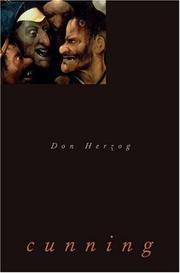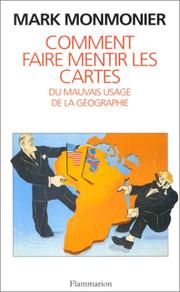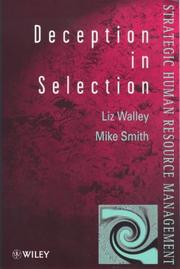| Listing 1 - 4 of 4 |
Sort by
|

ISBN: 0691124159 0691136343 9786612157202 1282157205 140082706X 9781400827060 9780691136349 9780691124155 9780691136349 9781282157200 Year: 2006 Publisher: Princeton : Princeton University Press,
Abstract | Keywords | Export | Availability | Bookmark
 Loading...
Loading...Choose an application
- Reference Manager
- EndNote
- RefWorks (Direct export to RefWorks)
Want to be cunning? You might wish you were more clever, more flexible, able to cut a few corners without getting caught, to dive now and again into iniquity and surface clutching a prize. You might want to roll your eyes at those slaves of duty who play by the rules. Or you might think there's something sleazy about that stance, even if it does seem to pay off. Does that make you a chump? With pointedly mischievous prose, Don Herzog explores what's alluring and what's revolting in cunning. He draws on a colorful range of sources: tales of Odysseus; texts from Machiavelli; pamphlets from early modern England; salesmen's newsletters; Christian apologetics; plays; sermons; philosophical treatises; detective novels; famous, infamous, and obscure historical cases; and more. The book is in three parts, bookended by two murderous churchmen. "Dilemmas" explores some canonical moments of cunning and introduces the distinction between knaves and fools as a "time-honored but radically deficient scheme." "Appearances" assails conventional approaches to unmasking. Surveying ignorance and self-deception, "Despair?" deepens the case that we ought to be cunning--and then sees what we might say in response. Throughout this beguiling book, Herzog refines our sense of what's troubling in this terrain. He shows that rationality, social roles, and morality are tangled together--and trickier than we thought.
Bedriegerij --- Bedrog --- Chicanery --- Deceit --- Deception --- Listen --- Misleiding --- Ruses --- Subterfuge --- Tromperie --- Deception. --- Truthfulness and falsehood --- Intrigue

ISBN: 2082115577 9782082115575 Year: 1993 Publisher: Paris: Flammarion,
Abstract | Keywords | Export | Availability | Bookmark
 Loading...
Loading...Choose an application
- Reference Manager
- EndNote
- RefWorks (Direct export to RefWorks)
Bedriegerij --- Bedrog --- Cartografie --- Cartographie --- Cartography --- Cartography [Primitive ] --- Chartography --- Chicanery --- Deceit --- Deception --- Listen --- Mapping (Cartography) --- Misleiding --- Ruses --- Subterfuge --- Tromperie --- Maps --- Cartes --- Analysis --- Analyse --- Cartographie. --- Tromperie. --- Cartes geographiques

ISBN: 0471974986 9780471974987 Year: 1998 Volume: *1 Publisher: Chichester: Wiley,
Abstract | Keywords | Export | Availability | Bookmark
 Loading...
Loading...Choose an application
- Reference Manager
- EndNote
- RefWorks (Direct export to RefWorks)
Bedriegerij --- Bedrog --- Chicanery --- Deceit --- Deception --- Doorlichting van personeel --- Employee screening --- Employee selection --- Employees Hiring --- Employees [Selection of ] --- Listen --- Misleiding --- Personeel--Doorlichting --- Personeelsselectie --- Personnel--Dépistage --- Ruses --- Selecteren van personeel --- Subterfuge --- Sélection du personnel --- Tromperie --- Employee screening.

ISBN: 0521459788 0521453763 9780521459785 0511520980 9780511520983 9780521453769 Year: 2003 Volume: *7 Publisher: Cambridge: Cambridge university press,
Abstract | Keywords | Export | Availability | Bookmark
 Loading...
Loading...Choose an application
- Reference Manager
- EndNote
- RefWorks (Direct export to RefWorks)
Defining lies as statements that are intended to deceive, this book considers the contexts in which people tell lies, how they are detected and sometimes exposed, and the consequences for the liars themselves, their dupes, and the wider society. The author provides examples from a number of cultures with distinctive religious and ethical traditions, and delineates domains where lying is the norm, domains that are ambiguous and the one domain (science) that requires truthtelling. He refers to experimental studies on children that show how, at an early age, they acquire the capactiy to lie and learn when it is appropriate to do so. He reviews how lying has been evaluated by moralists, examines why we do not regard novels as lies and relates the human capacity to lie to deceit among other animal species. He concludes that although there are, in all societies, good pragmatic reasons for not lying all the time, there are also strong reasons for lying some of the time.
Bedriegerij --- Bedrog --- Chicanery --- Credibilite --- Credibility --- Deceit --- Deception --- Falsehood --- Geloofwaardigheid --- Insincerite --- Leugen --- Listen --- Lying --- Mensonge --- Misleiding --- Onoprechtheid --- Ruses --- Subterfuge --- Tromperie --- Truthfulness and falsehood --- Untruthfulness --- Vérité et mensonge --- Waarheid en leugen --- Deception. --- Truthfulness and falsehood. --- 800:159 --- #SBIB:309H517 --- Psycholinguistiek. Neurolinguistiek --- Verbale communicatie: sociale psychologie van de taal en de interactie, psycholinguistiek --- 800:159 Psycholinguistiek. Neurolinguistiek --- Believability --- Reliability --- Truth --- Honesty --- Intrigue --- Social aspects --- Post-truth --- Social Sciences --- Sociology
| Listing 1 - 4 of 4 |
Sort by
|

 Search
Search Feedback
Feedback About UniCat
About UniCat  Help
Help News
News